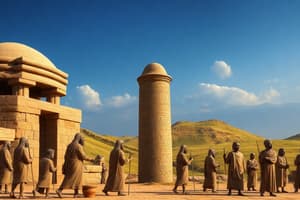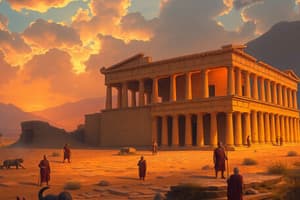Podcast
Questions and Answers
Which ancient civilization submerged by Spanish conquerors left lasting impacts on the regions they inhabited?
Which ancient civilization submerged by Spanish conquerors left lasting impacts on the regions they inhabited?
- Egyptian civilization
- Greek city-states
- Maya, Aztec, and Inca (correct)
- Ancient Rome
What significant contributions did the Roman civilization make to modern society?
What significant contributions did the Roman civilization make to modern society?
- Mathematics, astronomy, medicine
- Sculpture, painting, music
- Languages, government, architecture (correct)
- Philosophy, democracy, drama
Which ancient civilization can be credited with foundational principles that trace back to Western civilization?
Which ancient civilization can be credited with foundational principles that trace back to Western civilization?
- Viking culture
- Maya civilization
- Greek city-states (correct)
- Ancient China
In which region did Rome rise to power and eventually become an empire?
In which region did Rome rise to power and eventually become an empire?
Which aspect of ancient civilizations reveals insights into their values, interactions, struggles, and triumphs?
Which aspect of ancient civilizations reveals insights into their values, interactions, struggles, and triumphs?
Which group of ancient civilizations provided a rich tapestry of history that shaped our current world?
Which group of ancient civilizations provided a rich tapestry of history that shaped our current world?
What was a key achievement of the Ancient Sumerians?
What was a key achievement of the Ancient Sumerians?
Which ancient civilization was famous for its obsession with the afterlife?
Which ancient civilization was famous for its obsession with the afterlife?
What distinguished the Indus Valley Civilization from other ancient societies?
What distinguished the Indus Valley Civilization from other ancient societies?
Which aspect characterizes Ancient China's civilization?
Which aspect characterizes Ancient China's civilization?
What prompted the transition from a nomadic lifestyle to settled farming during the Neolithic Revolution?
What prompted the transition from a nomadic lifestyle to settled farming during the Neolithic Revolution?
Which factor contributed most to the development of the first civilizations in human history?
Which factor contributed most to the development of the first civilizations in human history?
Flashcards are hidden until you start studying
Study Notes
Ancient civilizations are the foundation of our modern world. These early societies, spanning from the Neolithic Revolution to the fall of the Western Roman Empire in 476 AD, laid the groundwork for governance, law, philosophy, mathematics, and science. Here, we delve into the history of ancient civilizations, focusing on their social, cultural, political, technological, and personal aspects.
Neolithic Revolution
This period marks the transition from a nomadic lifestyle to settled farming. It was during this time that humans began to develop societies, leading to the formation of the first civilizations.
Ancient Sumeria
One of the earliest civilizations, located in Mesopotamia, the Sumerians were known for their advancements in writing, agriculture, and city-building.
Ancient Egypt
The civilization of Egypt was centered around the Nile River and its fertile valley. It was characterized by its complex social structure, impressive architecture, and obsession with the afterlife.
Indus Valley Civilization
Another early civilization, the Indus Valley Civilization spanned parts of modern-day India and Pakistan. They were renowned for their urban planning, advanced sanitation systems, and trade networks.
Ancient China
China's ancient civilization was characterized by its rich cultural traditions, including Confucianism, Taoism, and the development of the Silk Road.
Ancient Greece
Greece was a collection of city-states that made significant contributions to philosophy, democracy, and drama. Many of the foundational principles of Western civilization can be traced back to ancient Greece.
Ancient Rome
Rome rose to power in the Italian peninsula and eventually became an empire that spanned Europe, northern Africa, and parts of the Middle East. The Roman civilization contributed significantly to modern languages, government, architecture, and more.
Ancient Mesoamerica and South America
The civilizations of Mesoamerica and South America, such as the Maya, Aztec, and Inca, were submerged by the Spanish conquerors in the 16th century. Despite this, their cultures left lasting impacts on the regions they inhabited.
These ancient civilizations provide a rich tapestry of history, revealing the early cultures, civilizations, and events that have shaped our current world. By studying their histories, we gain insights into their values, interactions, struggles, and triumphs, which are essential in shaping our understanding of our past, present, and future.
Studying That Suits You
Use AI to generate personalized quizzes and flashcards to suit your learning preferences.




